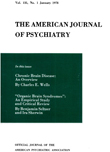Married Mental Patients in Crisis: A Research Report
Abstract
Married hospitalized mental patients differ significantly from unmarried patients; they exhibit fewer overt psychotic symptoms and have greater financial, social, and emotional resources. Their complaints are likely to be of an interpersonal or environmental nature involving the marriage partner. Yet married patients receive a standard type of treatment including ECT, drugs, and group therapy; very little family therapy is offered. The authors feel that marital conflict and environmental problems should be included in the treatment of married patients if an effective reentry into society is to be attained.
Access content
To read the fulltext, please use one of the options below to sign in or purchase access.- Personal login
- Institutional Login
- Sign in via OpenAthens
- Register for access
-
Please login/register if you wish to pair your device and check access availability.
Not a subscriber?
PsychiatryOnline subscription options offer access to the DSM-5 library, books, journals, CME, and patient resources. This all-in-one virtual library provides psychiatrists and mental health professionals with key resources for diagnosis, treatment, research, and professional development.
Need more help? PsychiatryOnline Customer Service may be reached by emailing [email protected] or by calling 800-368-5777 (in the U.S.) or 703-907-7322 (outside the U.S.).



